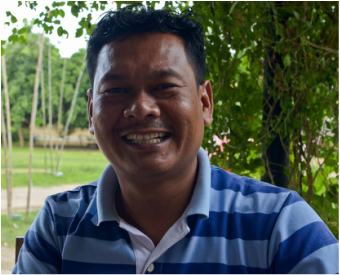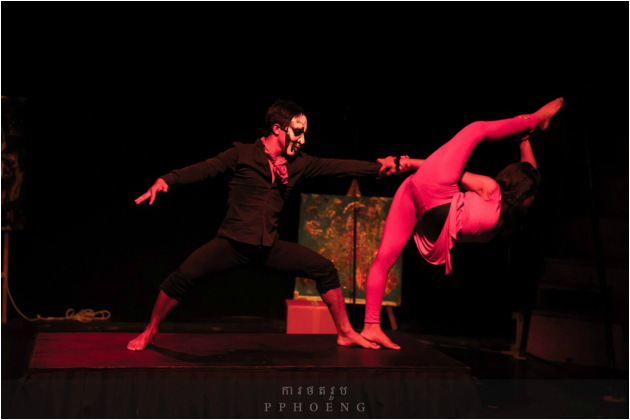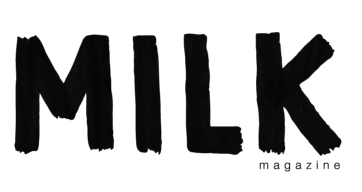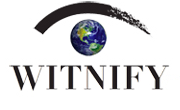| BANYAN BLOG |
banyan blog
|
SOKHA An elderly woman walks upon the stage, hunched over, carrying the burden of a life traumatized by war. She sits down on a stool contemplating the pain and sorrow of a time gone by, a stolen youth, of lost innocence. The somber music fades in slowly, evoking mournful regret, a deep sadness. She opens a book and looks at the empty pages. One by one, young men circle around her, unpeeling layers of her clothing to unveil her youth; her gray hair now shiny, long and black, her shawl and long brown sampot now unraveling into a student uniform; a white shirt and black skirt. The music speeds up in a whirlwind with heavy percussions and breathes new life into this old woman. She is now reborn to a time before war, a happier time in her youth. Her name is Sokha. Sokha is a play about a young girl whose life we see unfolding before our eyes; from the carefree days as a student to the ominous brink of civil war, to the nightmare of the Khmer Rouge. Then we see her and her friends recover from the ashes of war, dealing with the post-traumatic stress of nightmares and demons that still haunt her long after the physical wounds have healed. After the war, she struggles to help rebuild the nation by teaching the younger generation art and music, but she sees that they too are struggling to find their value and voice in society. This is not just any normal play. There was no dialogue between the actors. The only communication was done through the rise and fall of the music and the poetic and purposeful movement of their actors. This play entertained 4 year olds and 84 year olds who were equally amazed and took away different memories and meanings of the story. Most interesting, this was a circus play filled with juggling, high-rise balancing acts, summersaults, and a contortionist who bent her legs backwards and shot a balloon with a bow and arrow by the snap of her toes. This was not a play about a woman named Sokha, but the story of Cambodia, a story about the evolution of a nation rebuilding, healing through the arts, looking beyond the past to a more hopeful future. This is about the amazing work of an organization Phare Ponleu Selepak, who’s story of Sokha, of finding hope through adversity, is their story, from the founders, to the actors, to the students.  Lok Krou Khoun Det, one of the founders of Phare Ponleu Selpak. Photo © Arthur Nguyen Dao Lok Krou Khoun Det, one of the founders of Phare Ponleu Selpak. Photo © Arthur Nguyen Dao A CIRCUS IS BORN Phare Ponleu Selpak’s mission it is to help a nation heal one child at a time through the gift of art. Lok Krou (teacher) Khoun Det, one of the founders of Phare, speaks softly but carries a big presence. His legacy precedes him with many young artists often looking to him as a role model, someone for whom who often sacrificed his own well being for the sake of helping to build a better life for the next generation. Much like Sokha, Lok Krou Det’s life story mirrors Sokha, searching for a new beginning, to escape the tragedies of war and find peace, healing and hope through art. In 1994, he and his friends, who had lived in the refugee camp repatriated back into Cambodia after the Khmer Rouge. They founded Phare Ponleu Selepak, which means “brightness of the arts” to provide a safe, nurturing, and artistic environment to children, especially disadvantaged children. Lok Krou Det wrote Sokha and thought about it for three years (2009-2012) before it was finally produced and released to the public. Phare also does other performances including Tini Tinou, which is a fun and entertaining circus show letting students of the school showcase their work, to other shows in Siem Riep that deal with more serious societal issues such HIV/AIDS. I spoke to Lok Krou Det and asked him about how he became interested in art, how Phare started, and where he sees Phare’s future. INTERVIEW WITH LOK KROU DET Q: How did you become interested in art? Lok Krou Det: After the Khmer Rouge regime, I went to Site II refugee camp. I was young and an orphan at that time. I stayed at Site II until 1985 and I met some friends while living there. I was raised there. Because I was young, I never left there. That was the only world I ever knew. They gave us food, and shelter, but it was also confining, almost like a prison without walls. I became interested in art from a young French teacher by the name of Veronique Decrop. We studied drawing, acrobatics, and martial arts. I learned a lot from her, and she became like a mother to me. Then in 1985 we finally left the refugee camp. When I came back to Cambodia, I didn’t realize how big it was. I thought it was because we were so small. Our world was the refugee camp and now it expanded to a more hopeful future. Q: How did you get the idea to start Phare? Lok Krou Det: My friends and I really liked art and we wanted to continue it. When we left, there were about seven or eight artists. We talked to Veronique and we wanted to create this arts organization. We thought we could continue it because we actually really liked it and we could also help the younger generation to learn about art. We started the organization in Battambang in 1992 and in 1994 we started the art school. When we started we had about 25-30 students. They were around 10-15 years old. I think we had a lot of students in the beginning because we knew the village, they knew us, and the parents wanted their children to come to the school. Then we opened a library. At first, we had a lot of students who didn’t go to school because their parents wanted them to work. Many of the people in the village came from Site II. They didn’t have anything. That’s why we created a social support system to encourage parents to send their kids to school. So we tried to work with the parents first. Then we found orphans and scavenger kids who go around collecting trash to encourage them to go to school. Q: How does art help heal trauma? Lok Krou Det: Art can have many purposes, and can help us understand. If we practice, we can use it to help with our emotions. Art can help relieve stress, and help us to think. In my experience, drawing, circus, art, etc., can help a child who has suffered. We know we can help, but we do it in a way that they can’t see it. We create a fun environment for them, but as they progress, they are learning, they are healing through building confidence. However, we as teachers, have to be careful so that it doesn’t affect their emotions. We have to let them be a child, to let them play, to let them be healthy. If a child has problems, and they do art, it can really be cathartic, and help them mentally, physically and emotionally. It’s not a 100 percent, but it can help their health. We’ve had a few students like this. In Phare, we show them these ways, we talk about the society, talk about our history because it affects us all. We have to strengthen the children, our society, We cannot forget our collective experiences. Our country doesn’t have many books that teach about our recent past. I’ve taken students to meet with the scholars and researchers (such as Youk Chhang) to hear about their experience, to learn the history. Then they know, and understand. Some stories are very important. We have to encourage the leaders to do this research, because they have to teach the younger generation. The younger generation has to know because they will be the next leaders. Q: You created this NGO 20 years ago. How have you seen it changed? Lok Krou Det: We created Phare to strengthen, to help children who have been discarded in society. We try to give them value, to learn the arts, to do what ever it takes to give them an education. Before, we didn’t have much of an organization. When we started anyone could come in. Even when they grow up, we can give them social support. Presently many of our students have studied and worked abroad from the training and education they have received with us. That’s also a good opportunity for us. We invite them to go back and help give back to the PPS community. Those who have been discarded in society, we help them to become leaders in society. This is good for the nation. Even though their family doesn’t want them, society doesn’t want them, we will help them, we will value them. We try to help more children, the new generation, to become leaders. I hope that one day, they can help other students. We don’t want to prevent them from any opportunities, we are happy for them. But if they can help the society, help other children, we are happy. We are like a family. No matter where they go, they can always visit. They are part of us. We help each other out. We created Phare Ponleu Selpak (PPS) as a Cambodian Association, which is our NGO school that has been operating for the last 20 years. We recently expanded and created the Phare Performing Social Enterprise (PPSE) two years ago in Siem Reap, with PPS holding 71 percent share, then we have other shareholders. We wanted to create social enterprise model for two main reasons; to help create jobs and to help the Phare organization to be more sustainable. Now we want to buy some land. We are lucky because we have someone like the current CEO, Dara Huot, to help with our organization because he is young and he wants to help. Q: There are young people who look at you as a role model. What do you hope from the younger generation? Lok Krou Det: We need to teach the children to learn about things, about history, culture, but also to think outside of this world, Cambodia. If not, when they get older, they don’t have as much capacity to understand outside systems. Their mind is on Cambodia, but it’s important they expand their thoughts, ideas beyond the country, to think bigger. Culture enables people to have manners, to love, to understand how to live together. Arts takes from society, society takes from art. We almost lost these traditions, because of the Khmer Rouge, but even in today's society, many of our traditional values are almost lost because of outside influences. That’s why Phare Ponleu Selpak and Cambodian Living Arts (CLA) we are trying to keep the traditions so it doesn’t get lost. Q: When you started Phare, what was most challenging? What was the most rewarding? Lok Krou Det: The most difficult was finding funding at first, but eventually we did. We were passionate about it. When I did it, I learned from experience, to think and learn by doing. We didn’t have much at first and we had a lot of kids. We ate food at the same time. We shared what little food we had and would eat eat the same things because we didn’t have much money. I was already used to it, a hard life. But it was difficult to the children suffer. When they were happy, I was happy. When they were sad, I was sad. Looking at them reminded me of my own experience. The most rewarding would be when a student finished their studies and received recognition (in the country, and outside), when they know how to act and behave. That makes me proud and happiest. Q: Where would you like to see Phare 20-30 years from now? Lok Krou Det: In 20 years I’d like to see that Phare is recognized around the world. I’d like Phare to help Cambodia become more modernized and move forward in arts and culture. In our culture, we had circus in our history, but now it’s different. It's more modern, we have adapted. I hope that Phare can be model in all provinces, in all countries all over the world. When I first learned about this from Veronique, it was fun, but it also made us learn. I want Phare in Bangladesh, a Phare in Kabul. If I had the opportunity, I want to spread it all over the world. *CATCH PHARE PERFORMANCES IN SIEM REAP, BATTAMBANG AND PHNOM PENH* If you are in Cambodia, don't miss the opportunity to see the amazing shows! Phare performs every night in Siem Reap and four times a week in Battambang! In addition, the Tini Tinou International Circus Festival will also be coming to Phnom Penh in May 2015 featuring performers from France, Switzerland, Taiwan, Vietnam and Cambodia. Don't miss it! It will be an unforgettable experience* For further information about Phare, please visit their website at: www.pharecambodiancircus.org Read the Fact Sheets below to learn more about Phare Ponleu Selepak Social Enterprise and Phare NGO School.
0 Comments
Leave a Reply. |
FEATURED INMOST POPULARThe Journey Archives
October 2022
follow |
© banyan blog 2013-2022
All Rights Reserved
All Rights Reserved



